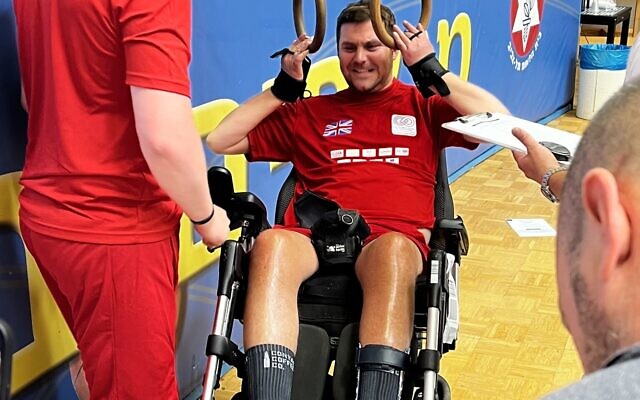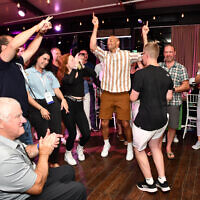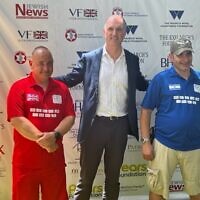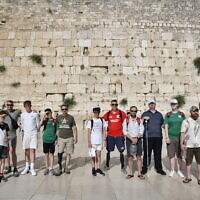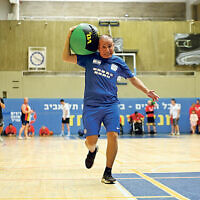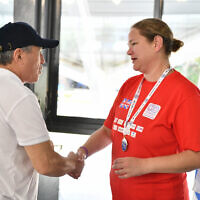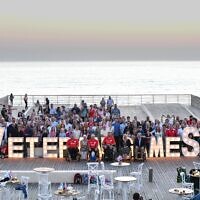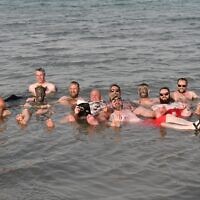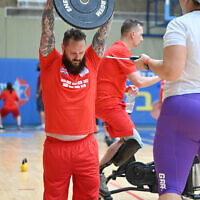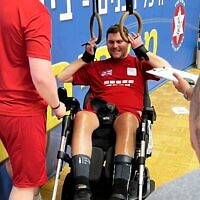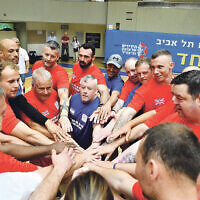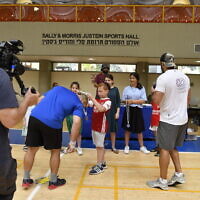Wounded UK veterans compete and dance in Israel to soundtrack of ‘Habibi Tel Aviv’
Britain can learn a lot from Israel's support for those whose war record is all too visible - and families are learning to bond again after conflicts which so altered their lives
Justin Cohen is the News Editor at the Jewish News
Willed on by fellow veterans from Britain and Israel, Rob Bugden strains every sinew to pull himself up on the gym rings suspended above him, his face the epitome of determination that is as much his hallmark now as when he served in the Royal Air Force.
Just a few hours earlier, the 37-year-old’s exploits were the centre of attention as he danced to the rhythm of ‘Habibi Tel Aviv’ at an impromptu party.
So far so unremarkable, you might think, save for the fact the former Royal Air Force instructor has been confined to a wheelchair since plunging 1,000ft to the ground and breaking several vertebrae in his neck in a horrific parachuting accident six years ago.
Bugden’s participation captured the spirit of the Veteran Games – a cocktail of fun, cultural tours and sporting competition based on the principle that it really is the taking part that matters – that brought 65 British veterans, their spouses and children to Israel last week.
Devised by Beit Halochem UK and funded by British Jewish philanthropists, the Games saw injured former servicemen and women compete against their Israeli counterparts in swimming, shooting and X-fit, while spending quality time with loved ones visiting sites including the Western Wall and the Dead Sea away from the stresses of everyday life.
“Sport has been my life since the age of five,” he enthused as the five-day trip drew to an end.
“This has been so good for my confidence and was also the first time I’d flown since the accident. Anyone who has a chance to take part should go for it – the only reason I want to go back is to see my dog.”
While several of those taking part had lost limbs serving Queen and country, for others it was the hidden mental wounds of war that continue to afflict.
For mum-of-one Amanda Small – who was injured in a mortar attack in Iraq in 2007 and whose soldier husband Chris took his own life in 2016 – the idea of competing left her feeling physically sick.
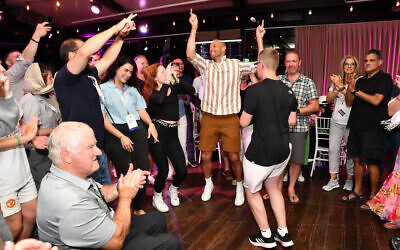 Back home in Suffolk, a routine trip to the supermarket was a struggle and a fear of large crowds meant trips to watch football with her son Jamie were kept to a minimum.
Back home in Suffolk, a routine trip to the supermarket was a struggle and a fear of large crowds meant trips to watch football with her son Jamie were kept to a minimum.
“It makes you feel a failure as a parent,” she reflected.
But cheered on by 12-year-old Jamie, she ended up taking home one gold and one silver medal from the pool.
“I feel like a new woman,” Small – who was invited by SSAFA: The Armed Forces Charity – told Jewish News.
“I’m going to put myself out there more and hope to take Jamie to more matches. I also want to do more public speaking.”
Now working in veteran mental health herself, she could never have imagined that within three days of arriving in Israel she’d be dancing with dozens of other veterans she’d met just a few days earlier.
But fuelled by a simcha playlist from the Games’ self-styled ‘ambassador of fun’ Marc Samuels, that’s exactly what happened.
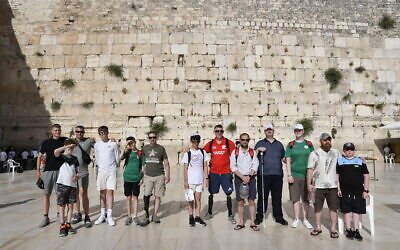 “When I arrived I was a shell of the person I am now,” she said. “I just hope I can take it forward. It’s down to the amazing support we’ve received and being part of a community again, like when we served.”
“When I arrived I was a shell of the person I am now,” she said. “I just hope I can take it forward. It’s down to the amazing support we’ve received and being part of a community again, like when we served.”
Admitting that news coverage of Israel had left her apprehensive, the former Air Force dog handler said: “You only hear the bad things but now I can go home and report how friendly the locals are and how beautiful the scenery and buildings are.”
Also excelling himself on the dancefloor was Ben Roberts, 41, who despite putting on the kind of display that left even those watching exhausted, said he’d hadn’t felt so calm in years after fulfilling a lifetime dream to visit Jerusalem.
The spirit of camaraderie wasn’t hard to find at or away from the sport: whether Israeli and British veterans enthusiastically clapping each other on throughout the week or former Royal Marine Christopher Hayes, attending his second Games as an ambassador, gifting his green beret to the father of a seriously ill woman he met to wish her strength in her health battle.
Everywhere you turned participants were conquering their own personal Everests, big and small.
For inspirational Clive Jones, who was blinded while serving his country 21 years ago, it was not a debut trip out of the UK with wife Stephanie – “a sort of unofficial honeymoon” – but also the first time he’d plucked up the courage to get into a swimming pool in a decade and the first time in a while he’d joined his family at the beach.
Such are his fears about allowing himself to relax. “Even now my head is going two to the dozen,” confided the Welshman as his son Ieuan, 17, enjoyed surfing metres away.
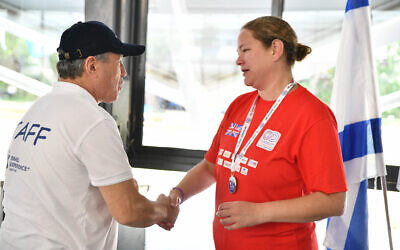 “I know it’s not easy on Steph and Ieuan. I’ve been asked to attend many of these events but had always said no. My son said he was absolutely loving it from day one and I apologised to him for not doing it before.”
“I know it’s not easy on Steph and Ieuan. I’ve been asked to attend many of these events but had always said no. My son said he was absolutely loving it from day one and I apologised to him for not doing it before.”
Saying the Games had given him a “kick in the b***ocks”, Jones said: “The real inspirations here are not only the other veterans but also the organisers and volunteers. However many times I say ‘thank you’ it would never be enough to show how grateful I am.”
Media partnered by Jewish News, the Games were funded by Pears Foundation, Wolfson Family Charitable Trust, Maurice Wohl Charitable Foundation, Exilarch’s Foundation, Charles Wolfson Charitable trust, Rachel Charitable Trust and Patron Charitable Initiatives.
On the sidelines, British and Israeli scientists and academics gathered for a conference on veteran mental health and explored the positive impact of sport on recovery, led by former head of the Royal College of Psychiatrists Sir Simon Wessely.
Praising the donors and Beit Halochem at the opening ceremony was UK veterans minister Leo Docherty, who hailed the project as an expression of the “amazingly close” bilateral relations in defence and intelligence sharing.
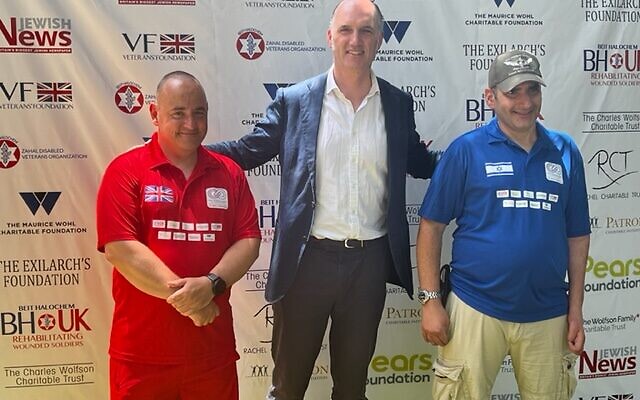
The MP said: “In our effort to provide a global gold standard there are definitely insights to be gained from the first-class provision available to veterans in Israel.”
He toured Beit Halochem’s state-of-the-art facilities in Tel Aviv where the Games were hosted – one of five centres nationwide that are designed to ensure no Israeli is more than an hour from support.
“The veterans here are embraced with their families,” he said. “The experiences of families is equally important if not more so; often the challenge for veterans is the breakdown of families.”
Father-of-two Andy Brown, from Devon, told the minister that the invite he received from the Not Forgotten Association to join the Games had offered a chance for “healing” for him and his two teenage boys.
After serving in the Army, he joined the London Ambulance Service, even helping to train Hatzola volunteers in Stamford Hill, but an accumulation of mental trauma led to him having to step away from the role.
He lost his sense of identity, suffered a breakdown and his marriage collapsed.
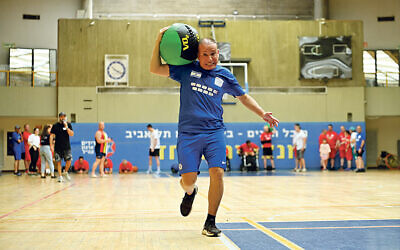 He said: “The boys have seen me unwell. This was a chance to do something positive for them and for them to see the other side of being a veteran – the camaraderie, the sense of community.
He said: “The boys have seen me unwell. This was a chance to do something positive for them and for them to see the other side of being a veteran – the camaraderie, the sense of community.
“It genuinely didn’t matter if I came last in everything – though it would have been slightly embarrassing – and I’m really proud the boys saw me having a go.
“We started making friends from the start and had a real laugh with the Israelis too. They’ve been through an awful lot here and so have we in the last 20 years – so there’s a lot of similarities.”
Brown joked however that his hopes of losing weight had been somewhat set back by the fact there was so much food “which you just had to try for cultural reasons”.
He even picked up a few words of Hebrew from Israeli veteran Nissim Mualem, who is still in touch with participants he met at the first Games in 2019 and was delighted that another group of Brits had the chance to see the Israel behind the headlines.
For triple amputee Spider’s wife Sarah, the chance to share experiences and build friendships with fellow military wives was a highlight.
For both her and the Iraq veteran’s former doctor Roos Allsop, who described the Games as “more than medication can offer”, the pride at watching him compete alongside others he’d been in recovery with proved too much to hold back the tears.
For son Scott, who enthusiastically took up the offer of football training with top Israeli coaches while the veterans competed, the impact of the trip was just as clear: “This is the best holiday I’ve had,” he said.
The focus on families was in evidence again at the closing ceremony when Beit Halochem UK chair Andrew Wolfson invited on stage the children of the veterans, many of them by now firm friends.
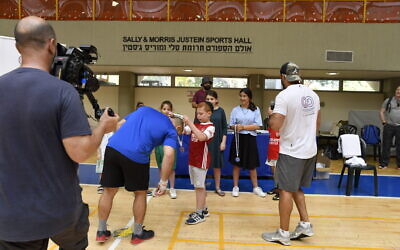 The Peres Centre-hosted ceremony, which included a rousing rendition of the National Anthem to kick off the Platinum Jubilee Weekend, was an opportunity to applaud all those who made the initiative possible including the tireless team at Israel Experience.
The Peres Centre-hosted ceremony, which included a rousing rendition of the National Anthem to kick off the Platinum Jubilee Weekend, was an opportunity to applaud all those who made the initiative possible including the tireless team at Israel Experience.
Reflecting on the trip with his wife and daughters Tilly and Ellen as they prepared to return to Norfolk, Pete Lauder – who served in the RAF in Afghanistan, Iraq and Kosovo – described the experience as “absolutely magical” and said the Games had finally “put to bed” doubts about his ability to compete.
He’s now set his sights on being selected for the Scottish team added for the Rugby League wheelchair World Cup later this year and to continue his work building an adaptive sport club for veterans and disabled kids in his local area.
“I’ve made some connections who are going to try to help get the word out,” he said.
And he wasn’t the only one in the family who returned with their sporting dreams boosted. For his youngest daughter, it’ll likely be some time before she comes down from cloud nine having had the chance to compete against – and beat – Israeli Paralympic swimming hero Hanoch Budin.
Sending a message of support was MP and foreign affairs committee select chair Tom Tugendhat, who himself served in Iraq and Afghanistan as a Territorial Army officer. He said: “Over these next few days I hope you’ll make new friendships and that we’ll all learn a bit more about the trauma war can cause, how to heal it and how sport can really help. So I’m very glad the PTSD conference is happening at the same time.”
Wolfson – who conceived the Games with CEO Spencer Gelding in 2019 – said a highlight was meeting families who were previously in a very dark place and “seeing people change in front of our eyes in real time”.
Beit Halochem UK had asked several veteran charities to put forward participants based on who they felt would most benefit and is now exploring how best to work with veterans once they’re back in the UK through support networks and events.
He said: “This was never supposed to be just a five day one-off trip. We want to help the participants to thrive long-term. Otherwise we’ve failed.”
Ahead of the charity’s 10th anniversary dinner this month, he also revealed plans to invite a third as-yet-undecided country to join the third Games in Israel as soon as May next year.
He insisted: “They will need to be carefully chosen so as not to lose the intimacy of the event or lead to it becoming too competitive.”
- Leo Docherty, UK Veterans Minister, with British and Israeli veteran competitors

Thank you for helping to make Jewish News the leading source of news and opinion for the UK Jewish community. Today we're asking for your invaluable help to continue putting our community first in everything we do.
For as little as £5 a month you can help sustain the vital work we do in celebrating and standing up for Jewish life in Britain.
Jewish News holds our community together and keeps us connected. Like a synagogue, it’s where people turn to feel part of something bigger. It also proudly shows the rest of Britain the vibrancy and rich culture of modern Jewish life.
You can make a quick and easy one-off or monthly contribution of £5, £10, £20 or any other sum you’re comfortable with.
100% of your donation will help us continue celebrating our community, in all its dynamic diversity...
Engaging
Being a community platform means so much more than producing a newspaper and website. One of our proudest roles is media partnering with our invaluable charities to amplify the outstanding work they do to help us all.
Celebrating
There’s no shortage of oys in the world but Jewish News takes every opportunity to celebrate the joys too, through projects like Night of Heroes, 40 Under 40 and other compelling countdowns that make the community kvell with pride.
Pioneering
In the first collaboration between media outlets from different faiths, Jewish News worked with British Muslim TV and Church Times to produce a list of young activists leading the way on interfaith understanding.
Campaigning
Royal Mail issued a stamp honouring Holocaust hero Sir Nicholas Winton after a Jewish News campaign attracted more than 100,000 backers. Jewish Newsalso produces special editions of the paper highlighting pressing issues including mental health and Holocaust remembrance.
Easy access
In an age when news is readily accessible, Jewish News provides high-quality content free online and offline, removing any financial barriers to connecting people.
Voice of our community to wider society
The Jewish News team regularly appears on TV, radio and on the pages of the national press to comment on stories about the Jewish community. Easy access to the paper on the streets of London also means Jewish News provides an invaluable window into the community for the country at large.
We hope you agree all this is worth preserving.
- Veteran Games
- Beit Halochem UK
- Royal Air Force
- Army
- Iraq
- Afghanistan
- SSAFA
- Christopher Hayes
- Royal Marines
- Pears Foundation
- Wolfson Family Charitable Trust
- Maurice Wohl Charitable Foundation
- Exilarch’s Foundation
- Charles Wolfson Charitable Trust
- Rachel Charitable Trust
- Sir Simon Wessely
- Andrew Wolfson
- Royal College of Psychiatrists
- Spencer Gelding


